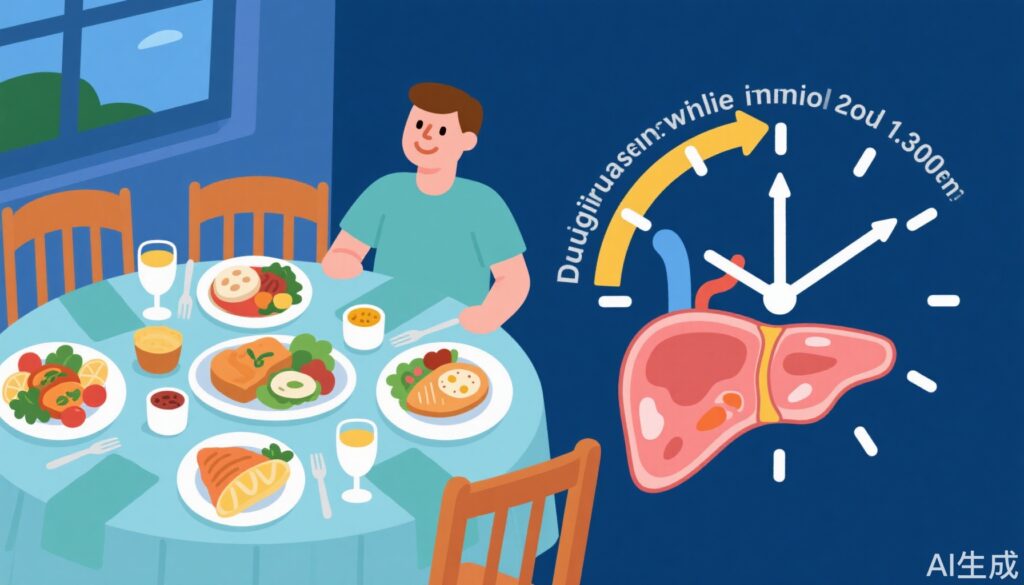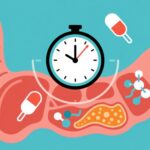Highlights
- Combining a Mediterranean diet with early time-restricted feeding (eTRF, 8 AM–6 PM) significantly improved glycaemic control in MASLD patients.
- All diet groups achieved comparable reductions in body weight and blood pressure over 12 weeks.
- eTRF provided superior improvements in insulin sensitivity compared to late TRF and unrestricted timing.
- High protocol adherence and real-world applicability support the feasibility of this intervention in clinical practice.
Study Background and Disease Burden
Metabolic dysfunction-associated steatotic liver disease (MASLD), previously termed non-alcoholic fatty liver disease (NAFLD), affects a significant portion of adults globally, especially those with overweight or obesity. MASLD is closely linked to cardiometabolic risk factors including insulin resistance, type 2 diabetes, and hypertension, and is a leading cause of chronic liver disease. Despite the high disease burden, there are no approved pharmacotherapies for MASLD; lifestyle modification remains the cornerstone of management. The Mediterranean diet (MD) is widely endorsed for its beneficial effects on liver fat and metabolic health. Recently, time-restricted feeding (TRF)—a form of intermittent fasting limiting food intake to specific daily windows—has gained attention for its potential to enhance metabolic outcomes and improve adherence. However, the optimal timing of TRF in conjunction with a Mediterranean diet and its effects on MASLD remained unclear prior to this study.
Study Design
The CHRONO-NAFLD Project was a 12-week, single-center, randomized controlled trial (RCT) registered at clinicaltrials.gov (NCT05866744). The study enrolled 59 adults (27 males; mean age 52.9 years; mean BMI 32.1 kg/m2) with MASLD and overweight/obesity. Participants were randomized into three parallel groups:
- Control group: Hypocaloric Mediterranean diet (MD) with no time restriction.
- Early TRF (eTRF) group: Hypocaloric MD with a 10-hour eating window (8 AM–6 PM).
- Late TRF (lTRF) group: Hypocaloric MD with a 10-hour eating window (12 PM–10 PM).
All groups received dietary counseling to achieve a hypocaloric Mediterranean-type diet. Compliance was monitored using food diaries and regular follow-up. Key outcomes included changes in body weight, anthropometric measures, blood pressure, glycaemic control (HbA1c), and insulin resistance (Matsuda index, HOMA-IR, fasting glucose-to-insulin ratio). An 8-week post-intervention follow-up assessed durability of effects.
Key Findings
1. Weight, Anthropometry, and Blood Pressure:
All three groups achieved comparable, significant reductions in body weight, waist circumference, and blood pressure over the 12-week intervention (mean BMI at baseline: 32.1 kg/m2). This confirms the efficacy of a hypocaloric Mediterranean diet for weight and cardiometabolic risk management in MASLD, irrespective of meal timing.
2. Glycaemic Control and Insulin Sensitivity:
The most notable finding was the superior improvement in glycaemic indices in the eTRF group:
- HbA1c and insulin resistance, as measured by the Matsuda index, HOMA-IR, and fasting glucose-to-insulin ratio, improved significantly in the eTRF group at 12 weeks.
- These benefits were not observed in the late TRF or control groups, suggesting that earlier eating aligns better with circadian metabolic rhythms, potentially enhancing insulin sensitivity and glucose homeostasis.
3. Safety and Adherence:
No major adverse events were reported, and adherence—assessed via food diaries—was high across all arms. The structured intervention and regular support likely contributed to these adherence rates. The 8-week follow-up revealed partial persistence of some benefits, though longer-term studies are needed.
4. Comparative Efficacy of Early vs. Late TRF:
While both TRF groups followed identical calorie and diet composition targets, only the early TRF (eTRF) window yielded significant improvements in glycaemic and insulin resistance parameters. This finding supports the growing body of evidence favoring meal timing congruent with daytime activity and endogenous circadian rhythms.
Expert Commentary
The CHRONO-NAFLD Project provides important clinical insight into dietary timing strategies for MASLD. It confirms that a hypocaloric Mediterranean diet remains foundational for metabolic health, but optimizing the timing of food intake—by adopting an early time-restricted feeding pattern—can confer additional metabolic benefits, particularly on glycaemic control.
These results are consistent with prior small-scale TRF studies in metabolic syndrome and diabetes, which also report improved insulin sensitivity and glycaemic profiles with early, but not late, feeding windows (Sutton et al., Cell Metab 2018; Wilkinson et al., Cell Metab 2020). The mechanistic rationale lies in circadian biology: insulin sensitivity and beta-cell responsiveness are highest earlier in the day, while late-night eating may disrupt glucose metabolism and hepatic lipid handling.
Limitations include the relatively small sample size and short duration; liver fat content was not directly measured, and the trial was not powered for clinical events. Nonetheless, the pragmatic design and real-world applicability of combining MD and eTRF offer actionable guidance for clinicians.
Conclusion
The CHRONO-NAFLD trial demonstrates that adding early time-restricted feeding to a hypocaloric Mediterranean diet results in superior improvements in glycaemic control and insulin sensitivity in MASLD patients, compared to unrestricted or late feeding patterns. All groups achieved meaningful reductions in weight and blood pressure, reaffirming the central role of dietary quality and modest calorie restriction. Early TRF may represent a simple, feasible adjunct to dietary therapy for MASLD, warranting further investigation in larger and longer-term studies.
References
1. Tsitsou S, Bali T, Adamantou M, Saridaki A, Poulia KA, Karagiannakis DS, Papakonstantinou E, Cholongitas E. Effects of a 12-Week Mediterranean-Type Time-Restricted Feeding Protocol in Patients With Metabolic Dysfunction-Associated Steatotic Liver Disease: A Randomised Controlled Trial-The ‘CHRONO-NAFLD Project’. Aliment Pharmacol Ther. 2025 Apr;61(8):1290-1309. doi: 10.1111/apt.70044. PMID: 40017349; PMCID: PMC11950810.
2. Sutton EF, Beyl R, Early KS, Cefalu WT, Ravussin E, Peterson CM. Early Time-Restricted Feeding Improves Insulin Sensitivity, Blood Pressure, and Oxidative Stress Even Without Weight Loss in Men with Prediabetes. Cell Metab. 2018 Jun 5;27(6):1212-1221.e3.
3. Wilkinson MJ, Manoogian ENC, Zadourian A, et al. Ten-Hour Time-Restricted Eating Reduces Weight, Blood Pressure, and Atherogenic Lipids in Patients with Metabolic Syndrome. Cell Metab. 2020 Dec 1;31(1):92-104.e5.


